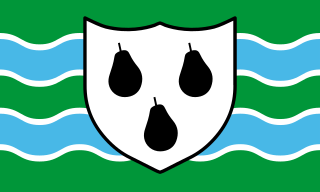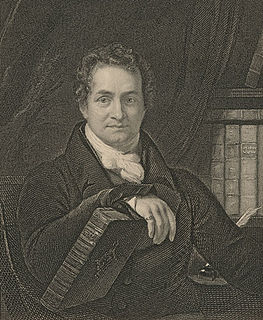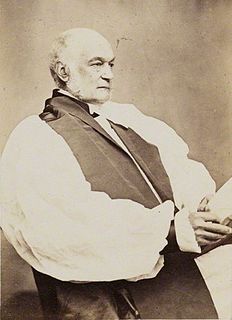
George Moberly was an English cleric who was headmaster of Winchester College, and then served as Bishop of Salisbury from 1869 until his death.
George William de Saulles was a British medallist. He authored and designed the obverse of coins from the United Kingdom and its colonies under Queen Victoria and Edward VII of the United Kingdom
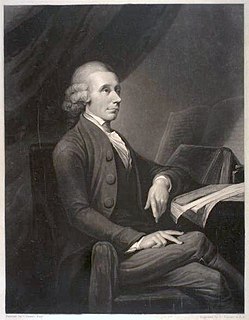
The Theological Repository was a periodical founded and edited from 1769 to 1771 by the eighteenth-century British polymath Joseph Priestley. Although ostensibly committed to the open and rational inquiry of theological questions, the journal became a mouthpiece for Dissenting, particularly Unitarian and Arian, doctrines.

William Mudford, was a British writer, essayist, translator of literary works and journalist. He also wrote critical and philosophical essays and reviews. His 1829 novel The Five Nights of St. Albans: A Romance of the Sixteenth Century received a good review from John Gibson Lockhart, an achievement which was considered a rare distinction. Mudford also published short fictional stories which were featured in periodicals such as Blackwood's Edinburgh Magazine, Fraser's Magazine, and Bentley's Miscellany. His short story The Iron Shroud, about an iron torture chamber which shrinks through mechanical action and eventually crushes the victim inside, was first published in August 1830 by Blackwood's Edinburgh Magazine, and later republished separately in 1839 and 1840 with the subtitle "Italian Revenge". Edgar Allan Poe is considered to have been influenced by The Iron Shroud when he wrote The Pit and the Pendulum having got his idea for the shrinking chamber from Mudford's story. Mudford was born in London, where his father made a living as a shopkeeper in Piccadilly. He was influenced by John Milton, Joseph Addison, Samuel Johnson, William Cowper, William Collins, Mark Akenside, Thomas Gray, and Oliver Goldsmith.
Annals of Philosophy was a learned journal founded in 1813 by the Scottish chemist Thomas Thomson. It shortly became a leader in its field of commercial scientific periodicals. Contributors included John George Children, Edward Daniel Clarke, Philip Crampton, Alexander Crichton, James Cumming, John Herapath, William George Horner, Thomas Dick Lauder, John Miers, Matthew Paul Moyle, Robert Porrett, James Thomson, and Charles Wheatstone.

The Regius Professorship of Hebrew in the University of Oxford is a professorship at the University of Oxford, founded by Henry VIII in 1546.

James Mitan (1776–1822) was an English engraver.
Henry Petrie (1768–1842) was an English antiquary and official.
Murray's Family Library was a series of non-fiction works published from 1829 to 1834, by John Murray, in 51 volumes. The series editor was John Gibson Lockhart, who also wrote the first book, a biography of Napoleon. The books were priced at five shillings; Murray's approach, which did not involve part-publication, is considered a fundamentally more conservative business model, and intention, than used by the contemporary library of the Society for the Diffusion of Useful Knowledge.
William Jones (1762–1846) was a Welsh bookseller, religious writer, and member of the Scotch Baptist church in Finsbury, London.
Pishey Thompson (1784–1862) was an English publisher and antiquarian writer, known as a historian of Boston, Lincolnshire. He spent the years 1819 to 1846 in the United States.
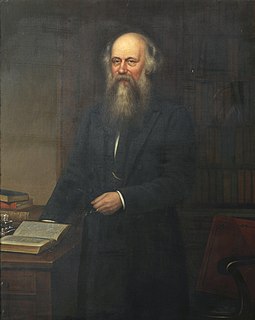
Joseph Angus was an English Baptist minister, college head, and biblical scholar.
Charles Frederick Partington was a British science lecturer and writer.
George Lipscomb (1773–1846) was an English physician and antiquarian, known particularly for his county history of Buckinghamshire.
George Robert Lewis (1782–1871) was a versatile English painter of landscapes and portraits.
John Reid (1808–1841?) was a Scottish publisher, author and radical activist.
Thomas Rudge was an English churchman, topographer and antiquarian, Archdeacon of Gloucester from 1814, and chancellor of the diocese of Hereford from 1817.
August Dupré (1835–1907) was a German chemist, a Fellow of the Royal Society, and naturalised in the United Kingdom in 1866.
Nathaniel John Winch (1768–1838) was an English merchant and botanist, known also as a lichenologist and geologist.
The public domain consists of all the creative works to which no exclusive intellectual property rights apply. Those rights may have expired, been forfeited, expressly waived, or may be inapplicable.

Sir Sidney Lee was an English biographer, writer and critic.

The Dictionary of National Biography (DNB) is a standard work of reference on notable figures from British history, published since 1885. The updated Oxford Dictionary of National Biography (ODNB) was published on 23 September 2004 in 60 volumes and online, with 50,113 biographical articles covering 54,922 lives.

